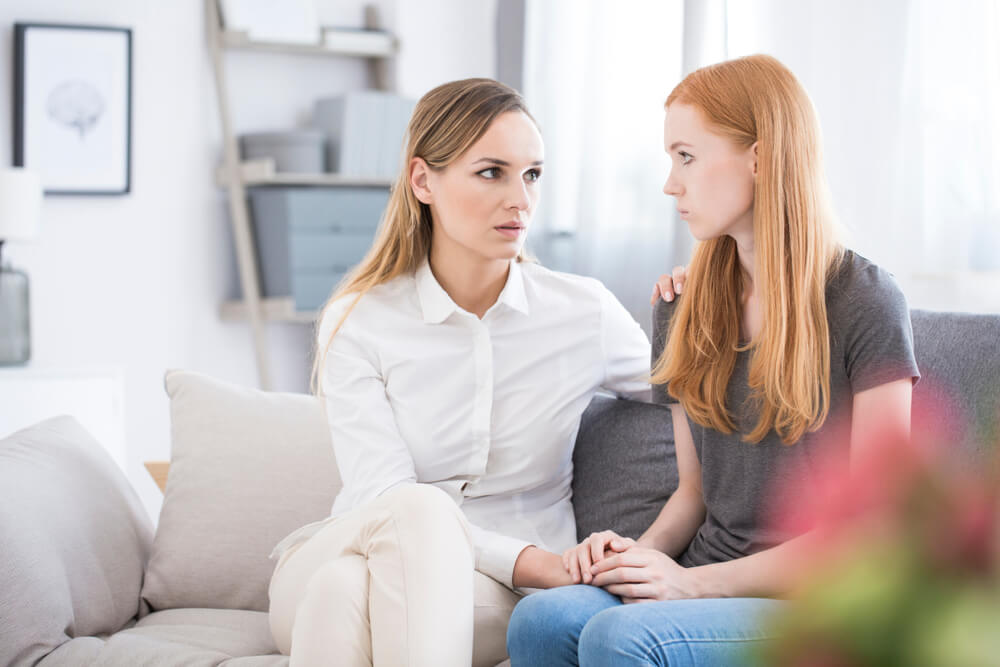
Eating disorder recovery can feel like a lonely road, but you shouldn’t have to walk it alone. Your support system plays an important role in helping you recover from an eating disorder. But what exactly is a support system, and how involved should they be in eating disorder recovery?
If you or someone you love is struggling with an eating disorder, you probably have a lot of questions about the role of your social support system in the recovery process. This blog post will answer all of those questions by touching on topics — including what the heck we mean when we say “support system!”
What is a Support System?
In school, you were probably told that you should always have at least one teacher whom you felt comfortable going to if something was wrong. This is a good example of a support system in action!
Your support system should definitely include trusted mentors, but also family members, significant others, friends, and medical professionals. In short, anyone who provides you with support benefitting your mental health can be considered as part of your support system. That support can take many forms, including social support, emotional support, and even medical support when needed.
You don’t need to have an eating disorder to receive these types of support from loved ones or to build a steady support system. In fact, having a strong support system is a protective factor against mental illness. Supportive friends and family won’t guarantee that you won’t develop mental illness, but it does play a part in preventing its onset. Research shows that people with strong support systems have better health, longer lives, and higher well-being than those who do not.
Likewise, your support system plays an important role in helping you recover from mental illness — including eating disorders. Having strong support from loved ones ensures you never feel alone. That’s just one reason why many aspects of eating disorder treatment, such as group therapy and residential treatment, focus on fostering connections with others who understand what you’re going through.
Who is Part of Your Support System?
We all have support systems, whether we realize it or not. What differs between us is the strength of those supports, as well as whom we include in our support system.
An example? For many of us, family members like parents and siblings play an important role in our support systems. However, others do not have a positive relationship with their families. For these people, it may even be necessary to cease contact with their families (or certain members of their families) to protect their mental health.
One of the most difficult parts of forming strong connections is identifying whom we can rely on as part of our support system. To identify members of your own support system, think back on the people who have been there for you in the most difficult moments of your life. Whether they hugged you while you cried or brought you ice cream when you were sick, or even provided medical care during a mental health crisis, they should be people you recognize as invaluable in your life.
It can help to make a list of people you recognize as part of your support group so that you always know who to call in a mental health emergency. To get the juices flowing, here are some of the people you might want to consider as part of your list of supports:
- Your parents and/or siblings
- Other close relatives, like grandparents, aunts or uncles, or cousins
- Your partner
- Your professional mentor(s)
- Your psychiatrist and/or therapist
The Role of Support Systems in Eating Disorder Recovery
Our support systems play an important role in our emotional well-being. Oftentimes, members of our support system can recognize a mental health crisis coming on before even we can. In eating disorder recovery, this means that the members of our support system can play an important role in facilitating a swift and full recovery.
However, it’s also possible for members of our support system to overstep their boundaries, or unintentionally say or do things that hurt rather than help our eating disorder recovery. So, what is an acceptable role for your support system to play in your eating disorder recovery — and at what point should you ask them to step back?
First, you must understand that your support systems cannot do the hard work of recovering for you. They can support your recovery by making statements of encouragement, cooking nourishing meals with you, and cheering you on as you pursue your recovery goals. But ultimately, it is not up to them whether or not you are able to overcome your eating disorder. You should be able to rely on your support systems, but not expect them to solve your problems or “fix” your eating disorder for you.
You should also recognize that your eating disorder is almost as difficult on your loved ones as it is on you. When we are caught up in our own problems, we sometimes forget to think about the way our problems affect others around us. At the end of the day, your loved ones do not want to see you or your health suffer. Watching you put your health in danger, or your self-esteem go into decline, may make them feel sad or angry. Worst of all, they may feel powerless to do anything about it.
The best thing you can do to help your support system help you is to clearly communicate about what they can do to help you, as well as the things they are doing that aren’t conducive to your recovery. Adjusting to having a loved one in eating disorder recovery often comes with a big learning curve. Especially if your loved ones used to frequently talk about food, body image, or weight with you before they knew that you were suffering, it could take time for them to learn to censor their speech in a way that supports your eating disorder recovery.
Be patient with your loved ones, express praise when they do something right, and don’t be afraid to ask them to stop doing something if it puts your recovery in danger. Ultimately, however, you may find that some members of your support system no longer vibe with you after beginning your eating disorder recovery journey. One example is a friend that you used to bond with exclusively over diet or exercise. After beginning eating disorder recovery, that friend might feel that their lifestyle is threatened by your recovery journey, especially if they have their own issues to work on. Or, you may simply find that you have little in common once you stop talking about food and exercise.
You might lose people through your eating disorder recovery journey, and that’s okay. At the end of the day, it hurts to lose a friend or loved one simply due to improving your mental health — but you should also rest assured that you are better off without that person in your life, at least for a little while, if they do not have a place in your life when you do not have an eating disorder.
How to Support Someone with an Eating Disorder
But what if you’re not the person in eating disorder recovery? What if you’re the person who wants to learn how to best support a loved one in eating disorder recovery? If you consider yourself part of the support system of someone in eating disorder recovery, you’re likely concerned with what to say or do around that person to be supportive, without inadvertently harming their progress in recovery — or jeopardizing your own mental health in the process.
If someone you love is suffering from an eating disorder, here are five things you should keep in mind as you support them, to help them recover without stressing yourself out:
- Avoid pointing fingers. You should never make your loved one feel as if their eating disorder is “their fault” — nor should you blame yourself for the development of their eating disorder. Recognize that eating disorders are a mental illness and that no one person is responsible for their onset. What’s most important is the role that you and your loved one can play in the recovery process.
- Don’t discuss weight. Topics of conversation like your after-New Year’s diet or your weekly Weight Watchers meeting might not seem like a big deal to most people. However, to someone in eating disorder recovery, talking about weight, dieting, or exercise can be extremely triggering. When your loved one first begins eating disorder recovery, they may not have developed the coping skills they need to deal with the negative thoughts and emotions they feel surrounding these issues. Until they are fully recovered, you should avoid these subjects and instead focus on other, more positive forms of conversation — which are honestly more interesting than your diet anyways!
- Cease enabling behaviors. No one intends to perpetuate their loved one’s eating disorder. Even so, we sometimes develop behaviors to accommodate our loved one’s behavior because we don’t like to see them suffer. For example, we may clean up their vomit after they purge, or cook them “safe” meals. Once our loved one enters eating disorder recovery, which requires them to challenge their eating disorder thoughts and behaviors, those accommodations might prevent them from seeing the negative consequences of their eating disorder. It’s important to recognize and put a stop to these enabling behaviors to avoid “covering up” the problems caused by their disorder.
- Talk about other things. It can be difficult not to talk about your loved one’s eating disorder when you’re around them. You may be concerned about them, and your concern may manifest as asking lots of questions about their treatment and recovery. However, it’s important to remember that your loved one is still there, beneath the eating disorder. Nurture that part of them, rather than feeding the disorder, by taking the time to talk about things outside of eating disorder recovery. Something as simple as chatting about the book they’re reading or their favorite song goes a long way toward helping a person in eating disorder recovery feel “normal” again.
- Take care of yourself. Your mental health matters just as much as the mental health of your loved one in eating disorder recovery. Just because you don’t have an eating disorder doesn’t give you an excuse to neglect your own self-care. As much as you want to be there for your loved one, no one can be “on” 24/7 without taking time for rest and relaxation. Don’t feel guilty for taking the time to soak in a hot bubble bath or catch up on your favorite TV show on Netflix. Taking care of yourself allows you to be better present for your loved one, without getting overwhelmed by your responsibilities.

All of these actions will help you better support your loved one in their eating disorder recovery. However, it’s important to recognize that nothing you do to help can fix your loved one’s eating disorder for them. Without proper treatment, their eating disorder may continue, regardless of your efforts to help them change. This isn’t your fault, but it does stress the importance of helping your loved one find the treatment they need. Our trained therapists can be a helpful resource for your loved one during their eating disorder recovery. Contact The Meadowglade today to discuss how we can help your loved one make strides of progress in their eating disorder recovery and support you both throughout the process.
